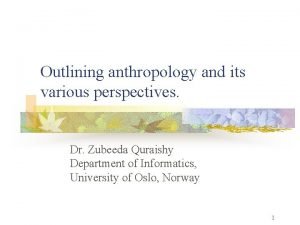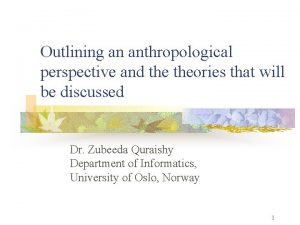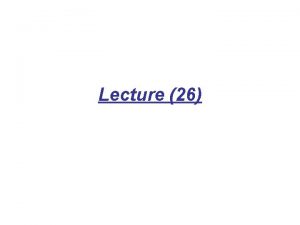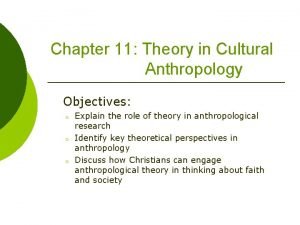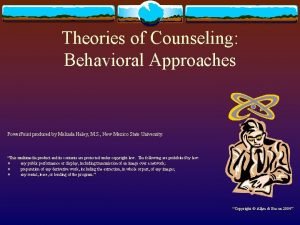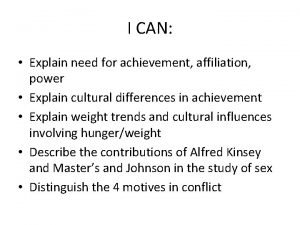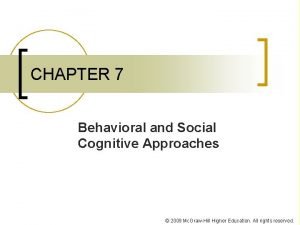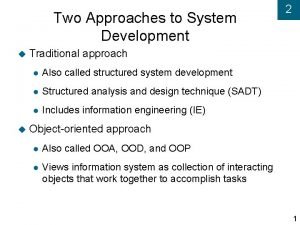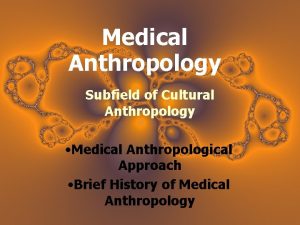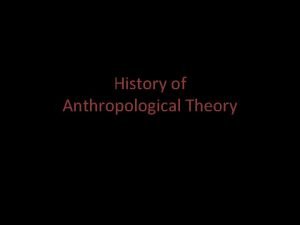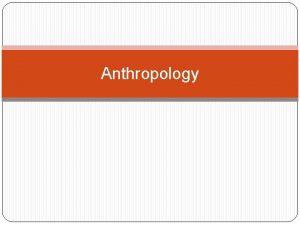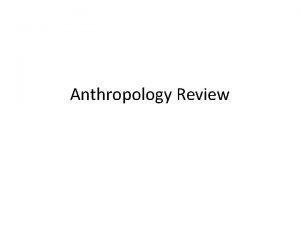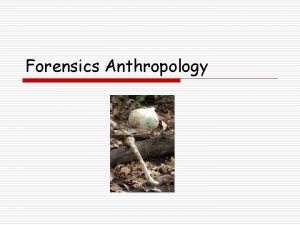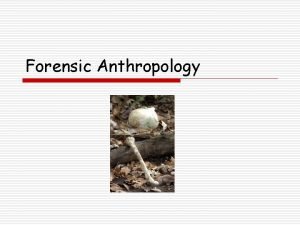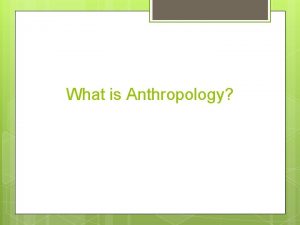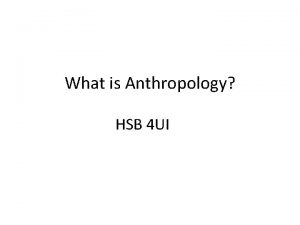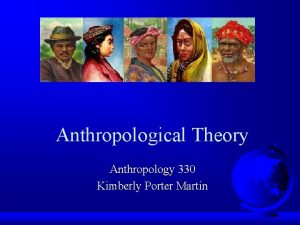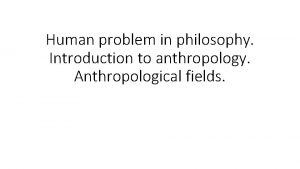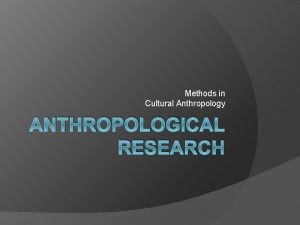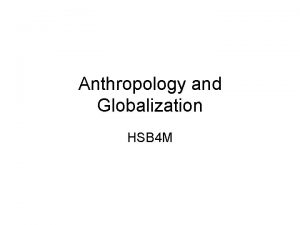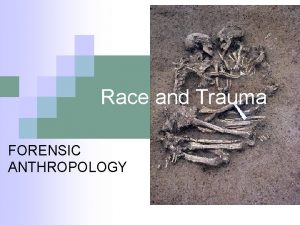Anthropological Approach What is Anthropology Anthropology The study






















































- Slides: 54

Anthropological Approach

What is Anthropology?

Anthropology The study (logos) of human beings (anthropos)







The aim of anthropology is to discover and explain the similarities and differences among human groups.

Specializations in Anthropology

Physical Anthropology

Physical anthropology This is the study of human kind from biological perspective. A major task of physical anthropology is to study the evolution of the human species over time and the biological processes involved in human adaptation.

Archaeology

Archaeology The study of human history and prehistory through the excavation of sites and the analysis of artefacts and other physical remains

Cultural Anthropology

Cultural Anthropology This field studies human behavior that is learned, rather than genetically transmitted and that is typical of a particular human group. These learned and shared kinds of human behavior are called culture.

Linguistic Anthropology

Linguistic Anthropology Studies languages, which is more than just written or spoken; it includes any kind of pattern communication between people.

Concept Of Culture



71

Culture is the customs, ideas, symbols, artifacts, and languages that human beings in groups share with and learn with one another.

Iceberg Model of Culture (Edward Hall: 1976)

Characteristic of culture • Culture is not the same as Nature

What about eating ? • What to eat • How to eat • When to eat • Where to eat

Then what about defecating? • Place of defecation • Defecating position • Variation of toilet • Use of toilet paper

Is ‘Space’ cultural ? • Public – Private • Proximity • Hierarchy



Japanese crowd avoiding eye contact

• Culture is learned



Enculturation • This is the process by which an individual absorbs the details of his or her particular culture, starting from birth.

• Culture is dynamic

Culture is constantly changing rather then remaining static Invention Diffusion



• Culture is Multiple


How to deal with the beliefs and behaviors that are different from my own? • Ethnocentrism

Ethnocentrism The tendency to view the world through the narrow lens of ones own culture or social position.

Cultural relativism • The idea that each culture must be understood in terms of the values and beliefs of that culture and should not be judged by the standard of another culture.

Critical cultural relativism • Offers an alternative view that poses questions about cultural practices and ideas in terms of who accepts them and why and who they might be harming or helping.

A different point of view is simply the view from a place where you are not

• Victory

• Defeat

Is it possible to see the world through the eyes of others?

Two crucial terms • Emic view • Etic view

Emic View • Refers to what insiders do and perceive about their culture. It included their perceptions of reality and their explanations for why they do what they do.

Etic view • Refer to the analytical framework and tools used by outsiders in searching for patterns of the insiders culture.

ETIC expression of EMIC views Medical Anthropology tries to explain the various ways in which people’s culture plays crucial roles in our health and wellbeing
 Anthropological perspective examples
Anthropological perspective examples Perspectives and examples of anthropology
Perspectives and examples of anthropology Anthropological argument
Anthropological argument Anthropological baseline
Anthropological baseline Infraorbitomeatal line
Infraorbitomeatal line Orbital meatal baseline
Orbital meatal baseline Pro australoids
Pro australoids Social change in anthropological perspective
Social change in anthropological perspective Anthropological materialism
Anthropological materialism Comparison of virtual circuit and datagram networks
Comparison of virtual circuit and datagram networks Theoretical models of counseling
Theoretical models of counseling Waterfall and sprinkler strategy
Waterfall and sprinkler strategy Multiple approach avoidance
Multiple approach avoidance Bandura's reciprocal determinism
Bandura's reciprocal determinism Research approach example
Research approach example Traditional approach vs object oriented approach
Traditional approach vs object oriented approach Tony wagner's seven survival skills
Tony wagner's seven survival skills Hình ảnh bộ gõ cơ thể búng tay
Hình ảnh bộ gõ cơ thể búng tay Slidetodoc
Slidetodoc Bổ thể
Bổ thể Tỉ lệ cơ thể trẻ em
Tỉ lệ cơ thể trẻ em Chó sói
Chó sói Chụp phim tư thế worms-breton
Chụp phim tư thế worms-breton Alleluia hat len nguoi oi
Alleluia hat len nguoi oi Môn thể thao bắt đầu bằng chữ đua
Môn thể thao bắt đầu bằng chữ đua Thế nào là hệ số cao nhất
Thế nào là hệ số cao nhất Các châu lục và đại dương trên thế giới
Các châu lục và đại dương trên thế giới Công thức tiính động năng
Công thức tiính động năng Trời xanh đây là của chúng ta thể thơ
Trời xanh đây là của chúng ta thể thơ Mật thư tọa độ 5x5
Mật thư tọa độ 5x5 Làm thế nào để 102-1=99
Làm thế nào để 102-1=99 Phản ứng thế ankan
Phản ứng thế ankan Các châu lục và đại dương trên thế giới
Các châu lục và đại dương trên thế giới Thơ thất ngôn tứ tuyệt đường luật
Thơ thất ngôn tứ tuyệt đường luật Quá trình desamine hóa có thể tạo ra
Quá trình desamine hóa có thể tạo ra Một số thể thơ truyền thống
Một số thể thơ truyền thống Cái miệng nó xinh thế
Cái miệng nó xinh thế Vẽ hình chiếu vuông góc của vật thể sau
Vẽ hình chiếu vuông góc của vật thể sau Thế nào là sự mỏi cơ
Thế nào là sự mỏi cơ đặc điểm cơ thể của người tối cổ
đặc điểm cơ thể của người tối cổ Thế nào là giọng cùng tên? *
Thế nào là giọng cùng tên? * Vẽ hình chiếu đứng bằng cạnh của vật thể
Vẽ hình chiếu đứng bằng cạnh của vật thể Phối cảnh
Phối cảnh Thẻ vin
Thẻ vin đại từ thay thế
đại từ thay thế điện thế nghỉ
điện thế nghỉ Tư thế ngồi viết
Tư thế ngồi viết Diễn thế sinh thái là
Diễn thế sinh thái là Dạng đột biến một nhiễm là
Dạng đột biến một nhiễm là Thế nào là số nguyên tố
Thế nào là số nguyên tố Tư thế ngồi viết
Tư thế ngồi viết Lời thề hippocrates
Lời thề hippocrates Thiếu nhi thế giới liên hoan
Thiếu nhi thế giới liên hoan ưu thế lai là gì
ưu thế lai là gì Sự nuôi và dạy con của hổ
Sự nuôi và dạy con của hổ
